Average Garage Size (Complete Guide)
This post contains affiliate links.
Many people wonder what a good size for a garage is. The truth is that garages come in many sizes and variations. Knowing these sizes and variations helps you to decide the right garage size for your home. What are the average garage sizes?
Garages generally are measured by the number of cars they can take in. Common sizes include 1-car, 2-car, 4 cars. A 1-car garage would be around 12-16 feet wide and 20-24 feet deep. A 4-car garage would be 36-44 feet wide and 20-30 feet wide.
In this post, we explore the average garage size. We also look at how you should decide what garage size suits your needs best.
Average Vehicle Dimensions (Chart)
| IN FEET | |||
| Width | Length | Height | |
| Compact & Sports Cars | 5-7 | 14-16 | 4-6 |
| Large & Luxury Cars | 6-7 | 16-18 | 4-6 |
| SUV’s & Trucks & Vans | 6-8 | 16-19 | 5-6 |
| Full Size Trucks | 6-8 | 19-20 | 6-7 |
| METERS | |||
| Width | Length | Height | |
| Compact & Sports Cars | 1.5-2.1 | 4.2-4.8 | 1.2-1.8 |
| Large & Luxury Cars | 1.8-2.1 | 4.8-5.4 | 1.2-1.8 |
| SUV’s & Trucks & Vans | 1.8-2.4 | 4.8-5.7 | 1.5-1.8 |
| Full Size Trucks | 1.8-2.5 | 5.7-6 | 1.8-2.1 |
If you are figuring out garage sizes for your house, start by looking at the size of common cars. This is because a garage’s main function is to store cars.
We recommend you use average car size measurements. You may live in the house for a long time and change cars several times.
This means you do not want to decide your garage size by measuring the current car you are driving.
Let’s look at the most typical car sizes so you can consider them as you make your designs.
Compact Cars & Sports Cars
Compact cars are either your small hatchbacks or your regular sedan car. These include Honda Fit, Toyota Corolla, and Chevy Malibu.
The measurement here should also fit your 2-door sports cars well. You should have enough space to walk around the car once parked in your garage.
- Length: 14 -16 feet
- Width: 5-7 feet
- Height: 4-6 feet
Larger Cars & Luxury Cars
These refer to 4-door cars and the larger luxury models. These cars are generally more spacious in the trunk, seating areas, and dashboard.
Some examples of these cars may include Toyota Camry, Cadillac CT5, Honda Accord, and more.
- Length: 16 – 18 feet
- Width: 6 – 7 feet
- Height: 4 – 6 feet
Vans, SUVs, & Trucks
These refer to your average large family cars. Think minivans, average SUVs, and your typical 2-door trucks.
These are popular vehicles, thanks to their larger size and space. However, you will need a larger garage to accommodate them. These trucks and SUVs include your Toyota Sequoia,
Ford Ranger, or Cadillac Escalade.
- Length: 16-19 feet
- Width: 6-8 feet
- Height: 5-6 feet
Full-Size Trucks
If you drive a full truck, you need a garage to accommodate them. These are large and long vehicles, which means you will need more length for your garage. You will also need some depth to swallow the whole truck in.
Examples of full-size trucks include the Ford F-150s, Toyota Tundra, and Nissan Titan. You will need an even larger garage if you drive anything bigger, such as a 4 x 6.
- Length: 19-20 feet
- Width: 6-8 feet
- Height: 6-7 feet
Here is one thing to remember when you’re trying to determine your optimal garage size. Don’t forget to add an extra 5 to 6 feet to the width of a vehicle to account for doors opening on both sides.
On top of that, you also want to have at least 6 feet of space for the front and back of the vehicle. This should allow you to park comfortably and be able to walk around the car easily too.
If not, parking the car every day will be a pain since you will have to inch your way in slowly. You then will have issues getting in and out of your vehicle too.
Standard Garage Sizes for 1,2,3 or 4 Cars (chart)
Now that you have determined the required size for your garage let’s now look at the average garage sizes.
Most people generally know garage sizes by how many cars they can accommodate. However, the calculations and the thinking process are much deeper than that.
| IN FEET | ||||
| Width | Depth | Height | Door Width | |
| 1 Car | 12-16 | 20-24 | 7-12 | 8-10 |
| 2 Cars | 18-26 | 20-24 | 7-12 | 12-16 |
| 3 Cars | 30-34 | 20-30 | 7-12 | 8-16 |
| 4 Cars | 36-44 | 20-30 | 7-12 | 8-16 |
| METERS | ||||
| Width | Depth | Height | Door Width | |
| 1 Car | 3.5-5 | 6-7.5 | 2-3.5 | 2.5-3 |
| 2 Cars | 5.5-8 | 6-7.5 | 2-3.5 | 3.5-5 |
| 3 Cars | 9-10 | 6-9 | 2-3.5 | 2.5-5 |
| 4 Cars | 11-13.5 | 6-9 | 2-3.5 | 2.5-5 |
Average 1 Car Garages
One-car garages are the smallest options. They fit one car and can be used as a shed or extra storage. You usually see 1 car garages in tight spaces such as cities.
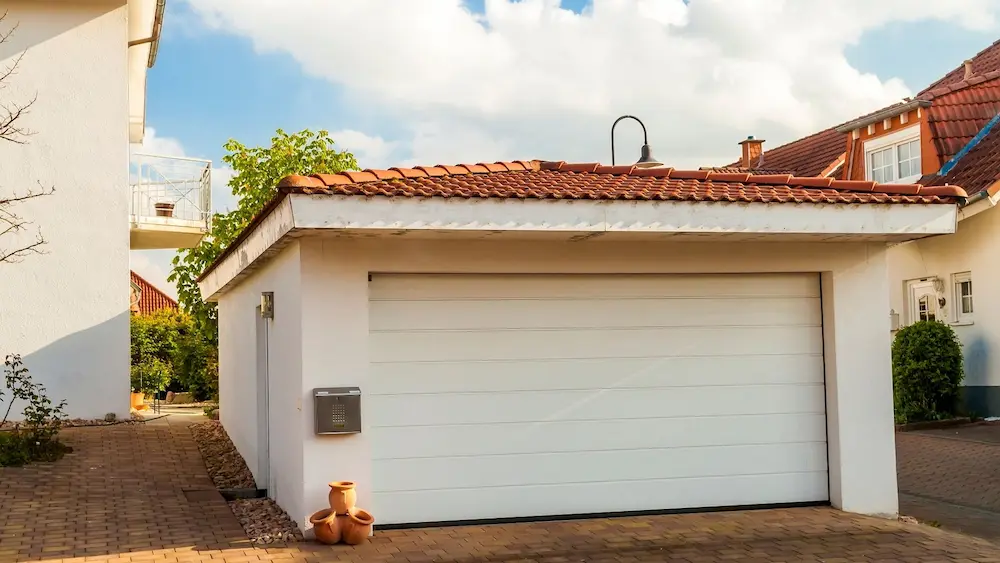
For single-car garage dimensions, there’s not a ton of variation. The majority come in at the following dimensions:
- Width: 12-16 feet
- Depth: 20-24 feet
- Door Width: 8-10 feet
That said, you have other options. Other common sizes are 14 x 22, 16 x 24, and 14 x 24. Those are regular sizes that are offered almost anywhere. The bigger sizes allow for more storage while allowing you to fit a car inside.
Average 2 Car Garages
A two-car garage is bigger. However, that doesn’t mean you need to own two cars.
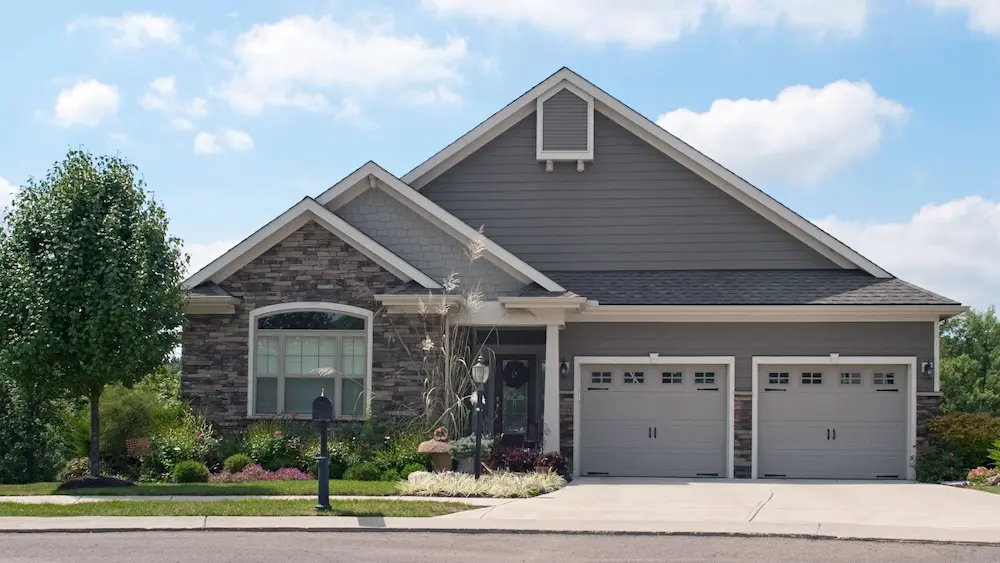
Generally, 2 car garages are perfect for a homeowner with one car and a lot of outdoor equipment, such as a lawn mower.
Some also turn the space for a second car into a shop, where they engage in woodworking, repairs, etc.
2 car garage sizes have quite a bit of variation because it is the most popular garage size. Here are your average ranges:
- Width: 18-26 feet
- Depth: 20-24 feet
- Door Width: 12-16 feet
Most experts say the minimum recommended dimensions for a two-car garage is 20×20. This size two-car garage will give space for two small vehicles. You won’t have adequate space for storing extra stuff, but it should get the cars inside.
Several other standard sizes exist, including 22 x 22 and 20 x 22. Some of these sizes make it far more convenient to open the doors of your car.
Average 3 Car Garages
The largest of the standard garage types is a three-car garage. These are ideal for families with children who drive. These garages are also best for large living or workspaces.
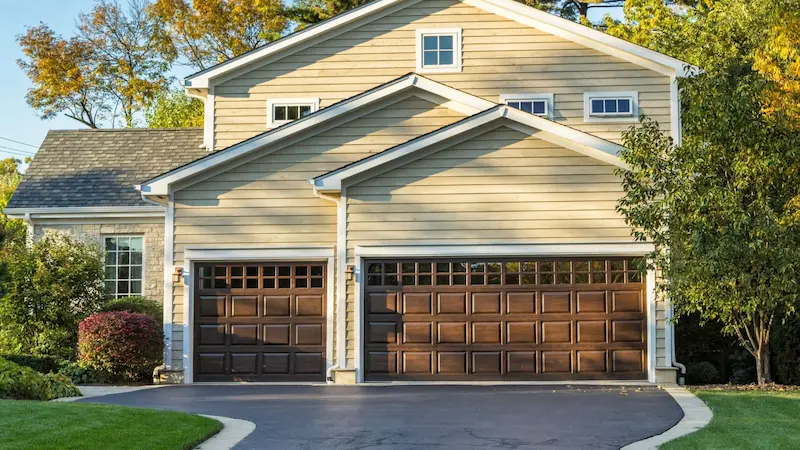
People have also successfully used a 3-car garage to run businesses such as auto repairs or even bakeries.
3 car garages become attractive because they need to have a post between 2-3 doors. There can be three separate garage doors. Usually, there’s a double-width door and a single-car door.
- Width: 30-34feet
- Depth: 20-30 feet
- Single Door Width: 8 feet
- Double Door Width: 16 feet
Three-car garages are usually 32 feet wide by 22 feet deep. Your other larger options include 36 x 25 feet, 38 x 26 feet, and 40 x 30 feet.
Average 4 Car Garages
4 car garages are for those ‘livin’ it large.’ Typical garage sizes pale in comparison to these giants. Usually only found in luxurious homes, a 4-car garage can be anywhere from 36 x 22 up.
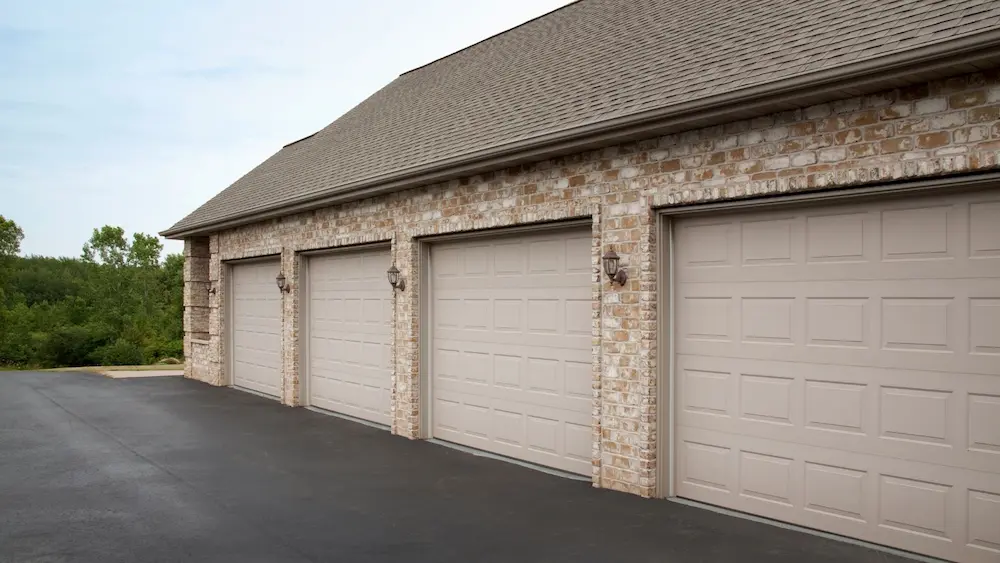
Garages this big is almost always detached from the rest of the home. They also usually feature various upgrades and custom features. Think of examples such as insulated garage doors and raised ceilings.
Some also build a 4-car garage and then turn it into a garage-dominium. That sounds like a mouthful, but it is basically the garage and living space together. These may be more common with landowners.
Since it is huge, the measurements can vary a lot here. But there are still averages you can expect to hover around:
- Width: 36-44 feet
- Depth: 20-30 feet
- Door Width: 8-16 feet each
These almost always have two garage doors at 16 feet in width, each with a post between them. They’ll often have the largest depth. This allows for cabinets, bike storage, and other extras you won’t find in smaller garages.
Standard Garage Height
Suppose you do not count the attic, bonus room, or apartment above the garages. In this case, the typical height for a garage comes in at 7 feet at least and usually 8 feet.
Those with vaulted ceilings still come in at 7 to 8 feet before the roof’s pitch starts turning inward.
If you want even more ceiling clearance, you may build a barn instead of a garage. Barns usually have 10-12 feet in height clearance.
Standard Garage Depth
Let’s take a look at the standardized depth of garages. Despite the width, since this will translate over to all the various widths:
- Standard Depth Range: 20 to 24 feet
- Minimum Garage Depth: 20 feet
- Depth of Storage Cabinets: 1 foot to 1.5 feet
Why does this matter? You must have enough depth to fit your whole car into the garage. This also needs to take into account that cars come in various lengths.
For example, a 1 car garage should be able to take in a small Honda Fit and also your Ford F150 as well.
Plus, you need enough room to not make mistakes like closing the garage door down on the trunk of your car. And you’ll still need space to walk around in the garage, room for cabinets, etc.
Garage Door Dimensions
Garage doors are where you may have a chance to customize things. In fact, garage doors can easily turn into a competition between neighbours.
This is because you can customize garage doors by type, material, size, and how they operate. There are even tiny garage doors for vehicles like golf carts, motorcycles, and ATVs.
But in general, size-wise, here’s what you can expect:
- Width: 8 feet for single-car garages plus 8 feet for each additional car
- Height: 7 feet
- Thickness: 1 to 1.5 inches
Even among the custom sizes, there are still standardizations. For instance, there are 9 feet wide garage doors to offer a bit more space on each side as you pull in.
There are also 8 feet tall garage doors and any other custom height you want. The thickness varies, but it’s usually half an inch. Usually, you will get two plates sandwiching half an inch of insulation on your garage door.
Some Tips About Determining Your Garage Size
While you spend time determining the size of your garage, keep in mind some of the points we discuss here as well. Some may play a part in your garage sizing decision. Some will also present options other than parking in a garage.
Attached or Detached Garage?
It is necessary to consider whether you want an attached or detached garage. If you want an attached garage, it comes with the residence. It has the advantage of sharing the same heating and cooling system.
But, if you’re looking for little privacy, detached garages are the way to go. This is because they’re not connected to your home and are stand-alone buildings.
This means you don’t have to worry about making too much noise. It’s like having your own private room.
Many owners use their garages as additional space to live or work. Detached garages make ideal workspaces, as you’re less likely to wake the family.
Attached garages often double as another room for your friends and family. You can also turn it into a ‘man cave’ and add in a pool table, home gym, or your weekly get-together.
Zoning Regulations on Garage Sizes
If you’re planning on building a garage, be mindful of local regulations. Ensure you’re meeting the regulations the country, city, or state sets.
They may have building codes. These are usually structural requirements. There should be some requirements for garages too.
Ensure you check with your HOA (Homeowner’s association) if there are such regulations. If there are, confirm where you should go and look for official documentation to refer to.
Are You Planning Ahead?
Here is one of the most critical mistakes people make with building garages. They underestimated the amount of space needed in the future.
Your vehicle isn’t a constant fixture. You may trade your full-size truck for something smaller and more fuel-efficient.
Furthermore, you may need to get rid of your Honda Civic and get a Toyota Sequoia to carry the kids around.
You may also need to think a little further if you have older children in your home. If they’re nearing driving age, will they have their own car?
Another thing to think about is will your house be a place to host family gatherings? If yes, you will need a larger garage for everyone to hang around in.
Make sure your garage plans for these events and situations.
Getting a double garage size with extra space is also becoming a trend. The idea is to keep the toys for the big boys, a recreational room, and a place for DIY projects. Call it the man cave.
Since everyone’s needs differ, go as big as needed to suit your needs. Since you are building a garage, you might as well go big.
One of the most frequent comments about garage size is, “I wish it were bigger.” Don’t be these people.
I’ve never heard anyone complain that their garage is too large! Think about going larger than a typical two-car garage; it will give you extra space.
Will Carports Work?
Suppose you do not need a garage to store things and just want to park a car. You also come to live in locations with mild year-round weather too.
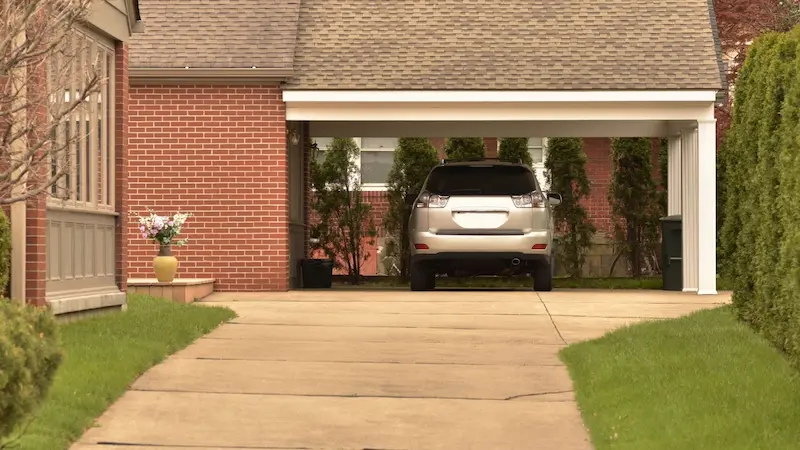
In this case, the garage may actually be a surplus. Will a carport work?
Carports are parking spaces with only a roof. They are much easier to build, as you only need to know the dimensions without worrying about storage or living space.
Carports are also excellent low-cost options if you do not need to keep your cars away from elements such as snow and frosty winters.
Since carports are outdoor spaces, they can also double up as a yard to do work. You can also throw barbecues with friends and family.
Base the size of your carport on your vehicle’s clearance requirements using your car size. You will want to factor another 6 feet wide to open both doors simultaneously. And give a little extra leeway off-center parking.
The average carport is about 12 feet tall to allow plenty of clearance and the option of lighting. Some extra-large vehicles, such as RVs, will need a higher roof.
Do You Want an Average-Sized Garage?
Custom-built garages can fit your requirements in any size or shape. That means there is no average garage size with those.
Having a custom-built garage also means fun. For example, you can do some pretty exciting things with your garage.
You can get a three-car garage with only one opening or even build a 4 car garage. Or anything you wish.
The height of your garage is also essential to consider. With a custom garage, you can make it very tall, allowing you to build a loft. This loft will enable you to design usable space while still parking your cars in the garage.
Get the Perfect Size Garage for Your Home
Knowing the average garage size of a 1,2, or 3-car garage is essential. It helps you decide how much space you’ll need for your new garage. How you’ll use your garage defines the amount of space you’ll need.
Creating a custom garage is always a good option. It allows you to make a garage that suits your needs. It’s ideal if you want to use your garage as something other than vehicle and equipment storage.






